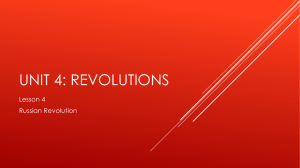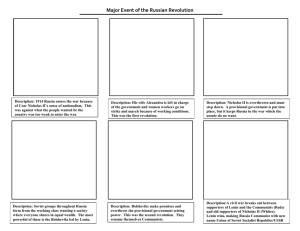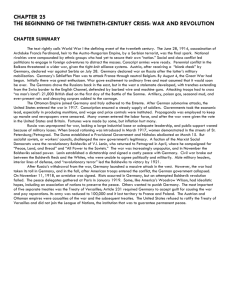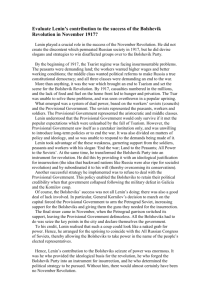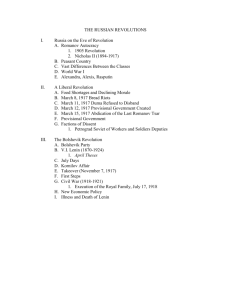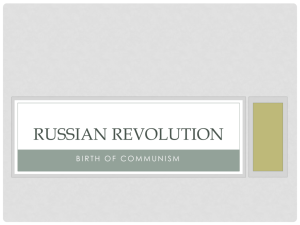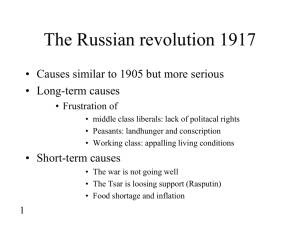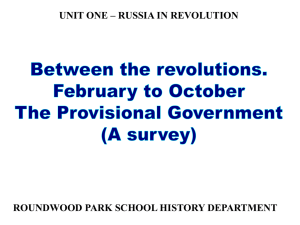How far was the Provisional Government
advertisement
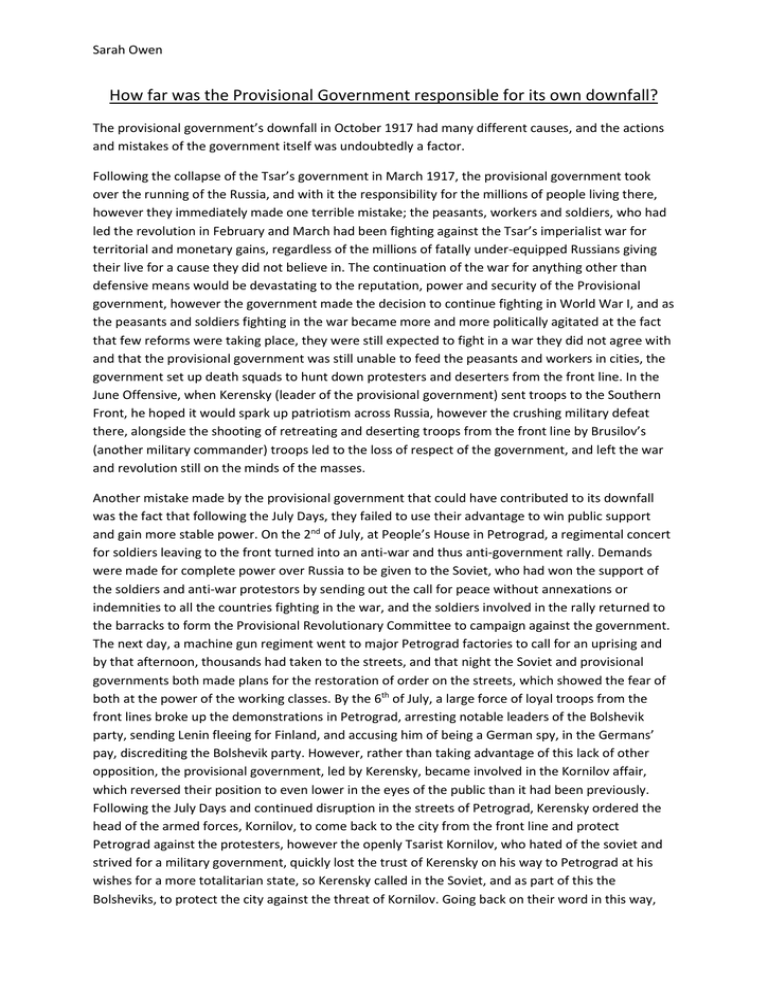
Sarah Owen How far was the Provisional Government responsible for its own downfall? The provisional government’s downfall in October 1917 had many different causes, and the actions and mistakes of the government itself was undoubtedly a factor. Following the collapse of the Tsar’s government in March 1917, the provisional government took over the running of the Russia, and with it the responsibility for the millions of people living there, however they immediately made one terrible mistake; the peasants, workers and soldiers, who had led the revolution in February and March had been fighting against the Tsar’s imperialist war for territorial and monetary gains, regardless of the millions of fatally under-equipped Russians giving their live for a cause they did not believe in. The continuation of the war for anything other than defensive means would be devastating to the reputation, power and security of the Provisional government, however the government made the decision to continue fighting in World War I, and as the peasants and soldiers fighting in the war became more and more politically agitated at the fact that few reforms were taking place, they were still expected to fight in a war they did not agree with and that the provisional government was still unable to feed the peasants and workers in cities, the government set up death squads to hunt down protesters and deserters from the front line. In the June Offensive, when Kerensky (leader of the provisional government) sent troops to the Southern Front, he hoped it would spark up patriotism across Russia, however the crushing military defeat there, alongside the shooting of retreating and deserting troops from the front line by Brusilov’s (another military commander) troops led to the loss of respect of the government, and left the war and revolution still on the minds of the masses. Another mistake made by the provisional government that could have contributed to its downfall was the fact that following the July Days, they failed to use their advantage to win public support and gain more stable power. On the 2nd of July, at People’s House in Petrograd, a regimental concert for soldiers leaving to the front turned into an anti-war and thus anti-government rally. Demands were made for complete power over Russia to be given to the Soviet, who had won the support of the soldiers and anti-war protestors by sending out the call for peace without annexations or indemnities to all the countries fighting in the war, and the soldiers involved in the rally returned to the barracks to form the Provisional Revolutionary Committee to campaign against the government. The next day, a machine gun regiment went to major Petrograd factories to call for an uprising and by that afternoon, thousands had taken to the streets, and that night the Soviet and provisional governments both made plans for the restoration of order on the streets, which showed the fear of both at the power of the working classes. By the 6th of July, a large force of loyal troops from the front lines broke up the demonstrations in Petrograd, arresting notable leaders of the Bolshevik party, sending Lenin fleeing for Finland, and accusing him of being a German spy, in the Germans’ pay, discrediting the Bolshevik party. However, rather than taking advantage of this lack of other opposition, the provisional government, led by Kerensky, became involved in the Kornilov affair, which reversed their position to even lower in the eyes of the public than it had been previously. Following the July Days and continued disruption in the streets of Petrograd, Kerensky ordered the head of the armed forces, Kornilov, to come back to the city from the front line and protect Petrograd against the protesters, however the openly Tsarist Kornilov, who hated of the soviet and strived for a military government, quickly lost the trust of Kerensky on his way to Petrograd at his wishes for a more totalitarian state, so Kerensky called in the Soviet, and as part of this the Bolsheviks, to protect the city against the threat of Kornilov. Going back on their word in this way, Sarah Owen and the reliance on the Bolsheviks showed the provisional government to be weak and the competition for power, the Bolsheviks, to be the defenders of Petrograd and Russian democracy. Of course, the provisional government’s downfall was not solely due to the mistakes they made, but also the ability of Lenin, and support for the Bolshevik opposition. The Kornilov affair was one of the most significant points for Lenin and the Bolshevik party; the provisional government’s actions played into their hands, providing them with military knowledge, training and equipment, which would be necessary for a coup, and the inadequacies of the government in protecting Petrograd and its inhabitants showed the Bolsheviks are stronger, more powerful leaders. In April of 1917, when Lenin returned from his exile to Petrograd, he reportedly stood on top of a car outside the Finland Station and gave a speech, reporting his April Theses, which he later had published in the socialist newspaper ‘Pravda’ (‘Truth’), giving the simple slogan ‘Bread, peace, land. All power to the soviet’. After his primary rejection by the majority of the Bolshevik party, two weeks later Lenin had won the support of almost all with his slogan and ideals. By not specifying a particular party, and instead just relating to the whole soviet, Lenin did not split the followers; it united them all, telling what they wanted to hear. His simplistic, effective slogan empowered the people, giving them the belief that Lenin, and thus the Bolshevik party, was the most powerful and stable party and that they were the right leaders for Russia. Overall, it can be argued that the provisional government was responsible for its own downfalls, due to the poor decisions, ineffective leadership and minimal reforms to satisfy the public, the ability of Lenin and his supporters was also a significant factor in the downfall of the provisional government, because without the Bolsheviks, their aims and reforming ideas, the public of Russia would have had no alternative to the provisional government and another society similar in structure to that which they had lived with under the Tsar, and this alternative is, I believe, what motivated the Russians for further change.
